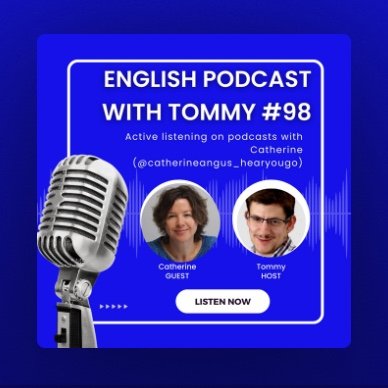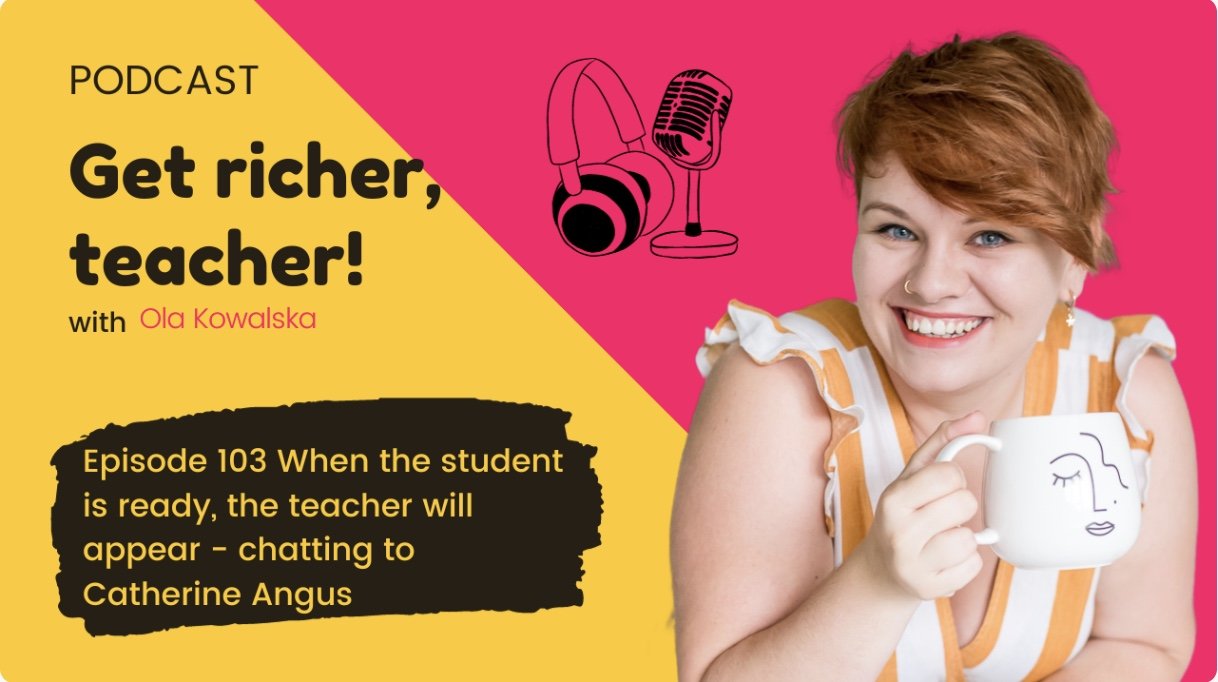Hello and welcome to Hear You Go podcast.
Watch to learn more about this incredible resource I make for your listening practice.
Hear You Go podcast is available on all podcast platforms, and is hosted and accessible on Podbean.com.
I've just had the loveliest conversation with one of my students who has started listening to your podcast. She said it's the perfect combination of of interesting topics and useful language advice.
She also said she finds your voice very soothing. — Sarah Morgan, Meaningful English
Catherine's podcast is for more than learning a new language and new vocabulary, it helps build confidence and fluency through the exploration of spoken English and, yes, listening skills too!” — A fan :)
Just wanted to let you know that I've been catching up with your latest podcast episodes and they all have some sort of a soothing effect on me.
Thank you for creating such a beautiful and unique product for both English teachers and learners! — Another fan!
I really enjoyed listening to this episode! I follow Fernanda on Instagram and she inspires me so much. It was interesting to learn more about her journey in learning English. I can definitely say that after I got help from professionals, my understanding of the language has changed a lot..for better, of course. I used to study only with textbooks and I'd get bored easily.
However, I've learned that learning a new language involves much more than studying with books and the process doesn't have to be boring. Catherine, you have helped me tremendously! — Bruna Dell’Orto, Toronto

Do You Speak Emoji?| Ideas in English for Advanced English Listening Practice.
Emoji.
Cute, colourful, easy to use. Or malevolent, dangerous, prone to offend.
I’ve been thinking about emoji a lot lately, in the context of language and culture. I’m confused by them, troubled by them, and eager to learn more about them.
Today, I offer what I’ve learned in my quest to be less ignorant about emojis.
I’ll define them and present their somewhat recent history
I’ll consider if they are a language
And I’ll look at the potential for miscommunication given our world’s diversity of languages, cultures and therefore, interpretation of meaning
I’m asking YOU to think about your use of emoji, to reflect on whether it’s a language, and if you too are worried about miscommunicating something when using them. Maybe I’m being silly and overly cautious. Have a listen and share your thoughts. Listen and let me know.

I Can’t Hear You!| Ideas in English for Advanced English Listening Practice.
Six months ago, I noticed I couldn’t hear my gym instructors clearly. At first, I chalked it up to the loud music, but then I realized it wasn’t the background noise, it was me.
In this episode, I’ll share:
What hearing loss is, and how it often changes as we age
Why hearing aids feel so different from reading glasses, and why that hit different for me
What we can do to protect our hearing, reduce the risks of dementia, and adapt when hearing loss happens
As always, I’ll also point out some advanced English expressions like chalk it up, the rub, and chide yourself, among others. So, listen now, and test out your listening skills in this intermediate English and advanced English language podcast episode.

It Takes Two to Tango with Lisa Wood| Advanced English Language Conversation.
Episode 79 – It Takes Two to Tango: A Conversation with Lisa Wood | Advanced English Conversations
In this episode of Hear You Go, I speak with English teacher and neuro-language coach Lisa Wood about the importance of being an active, kind, gentle listener in the dance that is a conversation.
Our chat is perfect for advanced English learners, English teachers, and anyone interested in mindset, confidence, and how listening shapes communication. You’ll hear how Lisa sees language learning as a dance between speaker and listener (it always takes two to tango!), and why connection—not perfection—is the real goal of fluency.
🎧 You’ll hear:
What The CALM Way is and how it supports learners
Why listening is never passive, but always active
How mindset influences confidence and fluency
Encouragement to show up and communicate, even if it’s not “perfect”
Enjoy this great example of the dance that is a conversation!

We all tell stories, but what stories do we tell? | Ideas in English for Advanced English Listening Practice
We all tell stories, but what stories do we tell? | Ideas in English for Advanced Listening Practice.
📚 In this episode of Hear You Go, I dive into The Bee Sting by Paul Murray—a Booker Prize–shortlisted novel about an Irish family falling apart, unraveling really, under pressure. Each family member tells their own version of events, showing us how perspective, memory, and emotion shape the stories we carry.
The episode explores:
Why personal narratives matter, both in novels and in our own lives
How different voices and perspectives in The Bee Sting reveal deeper truths
What language learners can take from the idea of rewriting their own narratives
Useful vocabulary for talking about stories and identity
I invite you to reflect on your narrative. What story do you tell about yourself—and how might you tell it differently?
🎧 Ready to rethink the stories you carry? Here we go…



